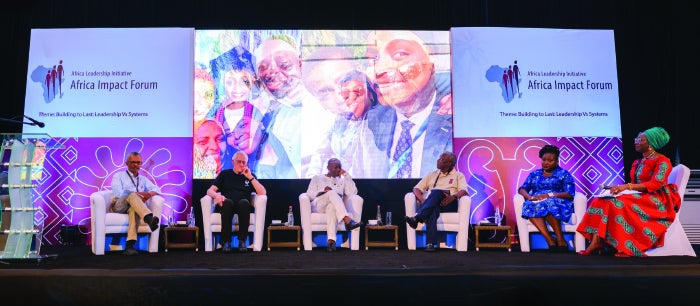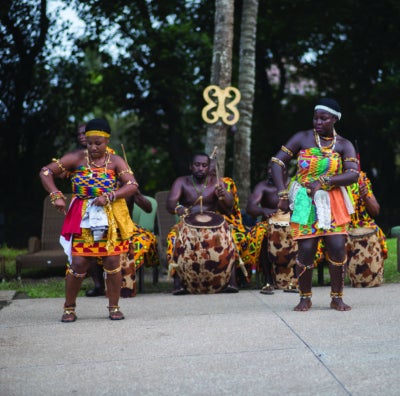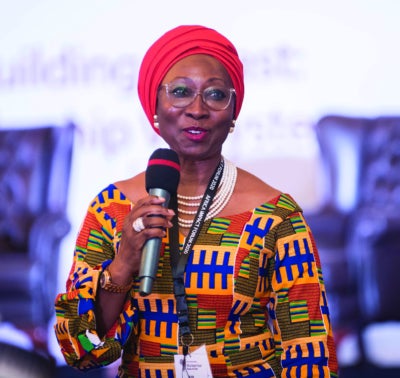“This is a call to arms,” Ken Ofori-Atta, Ghana’s minister of finance and economic planning, said in his opening remarks at the Africa Impact Forum. “There is no better time than now to rise up to the challenges facing the continent.” Ofori-Atta, a Henry Crown fellow and the founder of the Africa Leadership Initiative of West Africa, was one of more than 100 leaders from across the African continent who traveled in late February to Accra, Ghana, for the second Africa Impact Forum. Held biennially, the forum was inspired by the Aspen Institute’s Resnick Aspen Action Forum as a way for fellows from the Africa Leadership Initiatives of East Africa, South Africa, and West Africa—all members of the Aspen Global Leadership Network—to build and strengthen the connective tissue of their network and create opportunities for collaboration.

 The event opened with a traditional kete—a dance and drum ensemble commonly found in the Akan regions of Ghana—with dancers and musicians setting a lively tone for an intensive four days of workshops, panels, and the Institute’s signature moderated, textbased dialogues. The theme of the gathering was “Building to Last: Leadership vs. Systems.” This meant exploring the balance between good leaders and sustainable systems in governments, economies, civil society, and other institutions. The goal was to get participants thinking about how African countries could evolve from the perpetual state of fighting fires to building preemptive, resilient systems that will outlive the continent’s most formidable leaders.
The event opened with a traditional kete—a dance and drum ensemble commonly found in the Akan regions of Ghana—with dancers and musicians setting a lively tone for an intensive four days of workshops, panels, and the Institute’s signature moderated, textbased dialogues. The theme of the gathering was “Building to Last: Leadership vs. Systems.” This meant exploring the balance between good leaders and sustainable systems in governments, economies, civil society, and other institutions. The goal was to get participants thinking about how African countries could evolve from the perpetual state of fighting fires to building preemptive, resilient systems that will outlive the continent’s most formidable leaders.
The four-day event was supported by a number of partners, including the Aspen Global Leadership Network, Coronation Bank, Databank Foundation, LEAP Africa, Mastercard Center for Inclusive Growth, the John P. and Anne Welsh McNulty Foundation, and the National Communication Authority of Ghana. The agenda was packed. Some days started as early as 7:30 with meetings held by discrete fellowships. Official programming started at 9:00 in the morning and often went until 9:00 at night, featuring a mixture of artistic performances, speakers, panels, focused discussions, and workshops where fellows could learn from each other. Attendees gathered between sessions for informal conversations and reunions over meals. The weekend also featured optional excursions to Accra’s city center; the infamous Elmina Castle, a Portuguese trading post built in 1842 that served as a prominent stop during the Atlantic slave trade; and Ashesi University, the school founded by Ghanaian fellow Patrick Awuah and now one of Africa’s leading educational institutions. Through it all, there was a palpable feeling of joy, excitement, and possibility in the air—a common atmosphere when fellows come together.
 Eight experienced AGLN moderators guided groups of 20 participants through discussions that challenged them to think big and, importantly, critically and honestly: “What do you believe are critical pillars of stable societies?” “Are you upholding these pillars?” “Are you complicit in their demise when there are weaknesses?” “What is the continent we dream of ?” Fellows engaged with a specially curated selection of texts by African authors. The poetry, essays, and traditional African proverbs provoked a deep level of conversation, engagement, and enthusiasm. “These texts hit home and added nutrients to important conversations on building lasting systems,” said one seasoned moderator. “I don’t think there was a single session where everybody in the room did not have something to contribute. The challenge became keeping some people quiet to give others a chance.” Sessions channeled that energy toward conversations on challenges like intra-African trade, the tensions and opportunities that porous borders bring, how to leapfrog technologies, gender and age inequities, and environmental sustainability.
Eight experienced AGLN moderators guided groups of 20 participants through discussions that challenged them to think big and, importantly, critically and honestly: “What do you believe are critical pillars of stable societies?” “Are you upholding these pillars?” “Are you complicit in their demise when there are weaknesses?” “What is the continent we dream of ?” Fellows engaged with a specially curated selection of texts by African authors. The poetry, essays, and traditional African proverbs provoked a deep level of conversation, engagement, and enthusiasm. “These texts hit home and added nutrients to important conversations on building lasting systems,” said one seasoned moderator. “I don’t think there was a single session where everybody in the room did not have something to contribute. The challenge became keeping some people quiet to give others a chance.” Sessions channeled that energy toward conversations on challenges like intra-African trade, the tensions and opportunities that porous borders bring, how to leapfrog technologies, gender and age inequities, and environmental sustainability.
In his address to the forum, Olara Otunnu, the former United Nations undersecretary and an Aspen Institute trustee, tied these themes together. “There is something Africa needs,” he said. “The software of leadership. It’s to do with the heart and the mind. Too many leaders are disconnected from those that they lead. There’s no sense of shared destiny.” He issued a challenge: “How can we have leadership that is connected to those they lead? That shares the pain, the frustration, the hopes, the trials and tribulations of their people? Not apart from but part of it. We should be talking about how we realize imperatives. We have to leave Accra committed to the proposition that in Ghana, in Nigeria, in Africa, we are going out to build inclusive societies.”
“The pervasive sense amongst us as fellows is the importance of our pan-African connection and the necessity and power in approaching our challenges as a collective,” said Heather Sonn, an ALI-South Africa fellow and the moderator tapped to lead the thematic arc of the event. “Using our forum and network to facilitate this is a critical factor in the success of our endeavors. As we tackle our challenges with urgency and reverence for the responsibility, we are also deeply aware of the power of connection to the broader AGLN.”
Indeed, in the uncertainty and disruption brought by the Covid-19 pandemic, the seeds planted at the Africa Impact Forum have started to bear fruit. In South Africa, fellows are coordinating aid, raising money to support vulnerable populations, and solving last-mile problems of getting electronic vouchers to people living in shantytowns. In East Africa, fellows have figured out how to digitally deliver instantly redeemable cash to mobile phones, providing relief to those living in poverty. To maintain momentum and a pan-African view, fellows are holding Zoom meetings to learn about the work others are doing and where they can leverage the network to accelerate impact.
This connection and coordination is the embodiment of the vision of one of the co-founders of the Africa Leadership Initiative, Ali Mufuruki. Mufuruki, who died in 2019, was remembered in a panel named in his honor. In a video address at the start of the panel, John Simpkins, then–vice president of the AGLN, offered this reflection: “We are truly caught up in what Dr. King described as an inescapable web of mutuality. The fellowships that exist on the African continent find themselves in an inescapable web of mutuality with all of the other fellowships in the Aspen ecosystem as well.”
The forum ended with a powerful poem from Rwandan poet and ALI-East Africa fellow Hope Azeda, who passed the torch to the team planning the next gathering, in 2022. Reading an excerpt from her “Africa’s Hope,” she sent the crowd off with these words: “May you grow into the fullness of your eyes, lift up your land to sing on the hills. Sing with the bards. Roar with the lions. Oh Africa, let the colors of your trees, flowers, and women shout! And may God’s spirit fall upon you like harvest rain and comfort you with goodness and gladness and water your harrowed hearts with hope forever and ever and ever.”
Victoria Scheffel is the senior communications coordinator for the Institute’s leadership division.